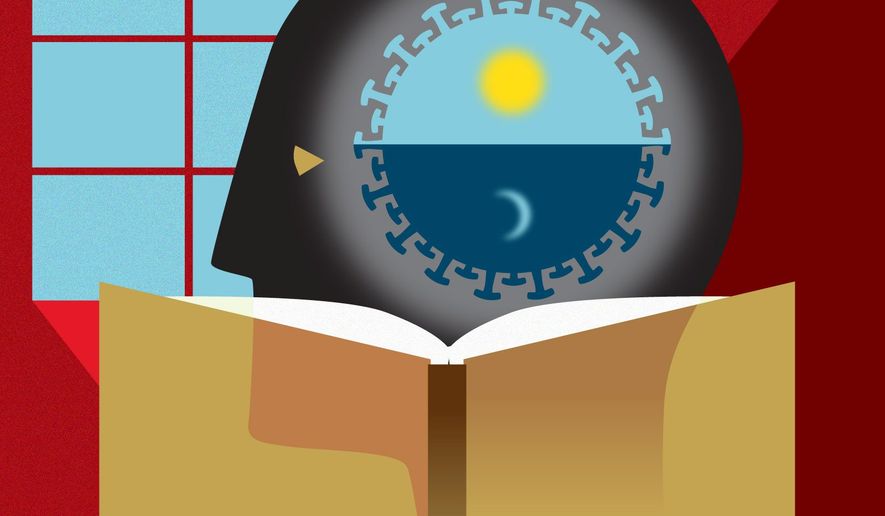OPINION:
My neighborhood is studded with small street corner kiosk “lending libraries;” and “Take a book, leave a book,” is an excellent inducement for a walk.
I have some interesting neighbors, for the content of these outposts varies from supermarket romances and self-help books of the 1980s to Yiddish poetry and the works of Samuel Beckett.
Last month I found and took several of the Frederick Forsythe novels (and read them for the umpteenth time), several Mary Renault (similarly) and, just last week, found “The Closing of the American Mind” by Allan Bloom (1987), of which I previously knew but the title.
Just as the 20-year-old man is astounded at how much his father had learned in 10 short years, I confess myself stunned by the prescience of Mr. Bloom.
As a youth, I was, indeed, on The Road to Damascus, but I was going the wrong way. When I discovered conservatism, the U.S. Constitution, Milton Friedman, Hayek, Shelby Steele and Thomas Sowell, I began to think, and, then I began to write. My book, “The Secret Knowledge” (2011), would have remained unwritten had I read Bloom, whose arguments were made not only in a previous, but in a more thoughtful, ordered, and, finally, more beautiful way than were my own.
The gambler’s term is “My Road Game” — that particular game or skill which one may take “On the Road,” and with which alone one may make a living. Mine has always been writing drama.
In one, I addressed those same concerns of which Bloom wrote. His book’s subtitle is “How Higher Education Has Failed Democracy and Impoverished the Souls of Today’s Students.” My play was “Oleanna” (1992).
Here, a confused and radicalized student and a complacent professor destroy each other’s lives. Just as we are seeing today.
The concern of the observant for the state of higher education, of course, predates Bloom, and the two best examples known to me are both from his University of Chicago.
The better known is “The Higher Learning in America” by Thorstein Veblen (1918), subtitled “A Memorandum on the Conduct of Universities by Business Men” its original subtitle, “A Study in Depravity.”
I found the third gem in the street-corner lending library, it is “Chimes” by Robert Herrick (1926).
Herrick is a currently-forgotten Chicago author. He deserved to be read and remembered — “Memories of an American Citizen,” “The Common Lot,” “The Real World” and so on. All available in reprints, right to your door tomorrow morning.
He was present at the founding of the University of Chicago as one of its first instructors, and taught there for many years.
“Chimes” is a roman a clef of the university’s founding, wrenched out of a mudpile on the South Side by Rockefeller money by William Rainey Harper, pictured as the huckster who could sell his shake-and-bake version first to the rich, and then to the bow-tie yokels one and all.
The book follows various professors through idealism, struggle, divorce, adultery, toadying, alcoholism, interdepartmental politics, disillusion, resignation and so on. It sits with Veblen and Bloom as “Groves of Academe” complements “Pictures from an Institution” and, indeed, Saul Bellow’s “Ravelstein” novel about Bloom. But enough “Learning.”
George Jean Nathan called the theater the “Fabulous Invalid,” but it is not the demise, but the decay and putrescence of the university which these Chicagoans have been decrying for a hundred years.
I’ve worked in and around institutions of higher learning for 50 years.
As per the so-called Liberal Arts, I have literally no idea what was being sold or purchased other than intellectual foot-binding, and the status supposedly derived therefrom.
Now, as Victor Davis Hanson writes, the “Essential Workers,” those permitted on the streets are plumbers, electricians and so on; and the Assistant Professors of Diversity, Semiotics and Intersectionalism having been identified as “Optional,” are invited to stay home.
It is too much to hope that they will stay at home when the crisis has passed; but perhaps, the American family will begin to do the math, at the kitchen table, and the budget will replace the SAT as the prognosticator of the family fortune, and a “Liberal Arts Education,” will sink back into the welcoming recess of time.
After the initial shock of the pandemic, we’ve all responded by activating that mechanism which, in some, had atrophied: the ability to separate between the essential from the optional.
The radicalized students of our current universities have, for some time, been insisting that these institutions, in effect, shut the hell down. The kitchen table can aid them to that goal.
In our national pause, a quarter-hour with a yellow legal pad and a pencil, reveals that an education better than that of the universities, is available to all, may be had now, free, at the kitchen table with an iPad or book.
A survey of Who’s Who on the Streets confirms that it is the thusly educated our American well-being requires.
• David Mamet is the author of “American Buffalo,” “Glengarry, Glen Ross” and other plays; and the screenplays for “Wag the Dog” and “The Verdict.” His most recent books are “Chicago” and “The Diary of a Porn Star.” He also has an online masterclass in screenwriting available at MasterClass.com.




Please read our comment policy before commenting.